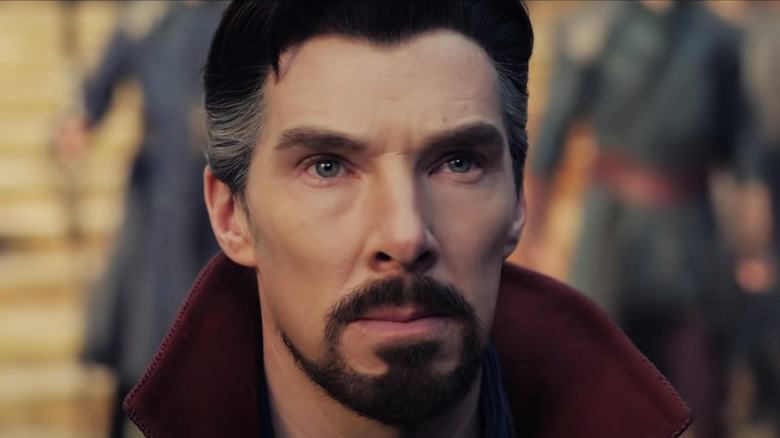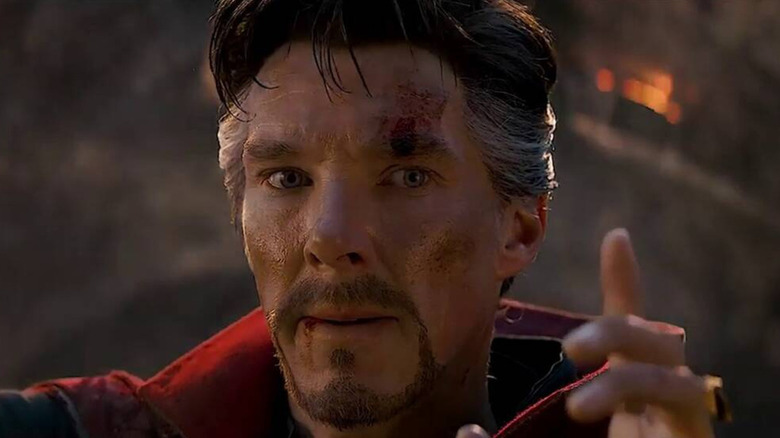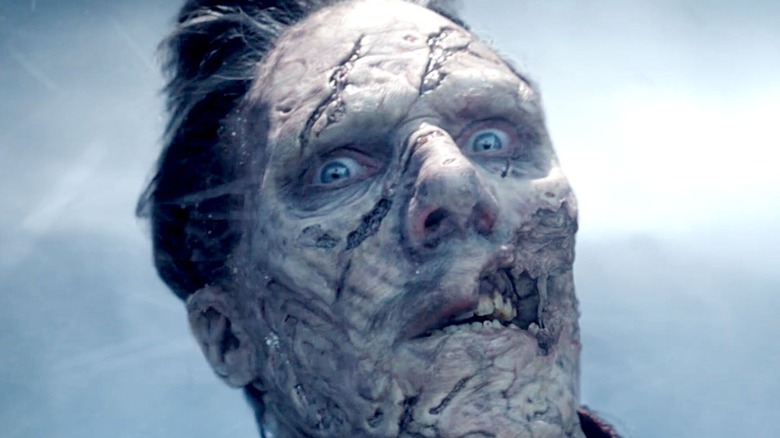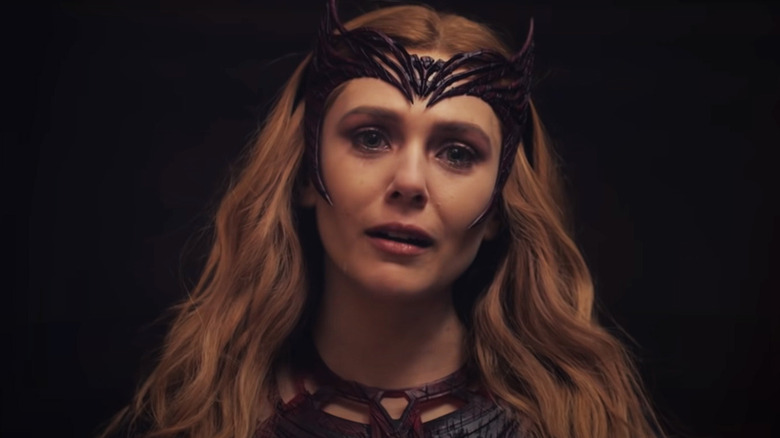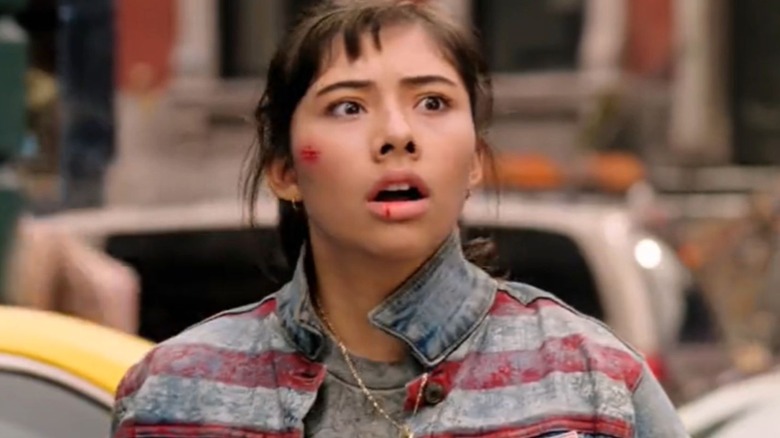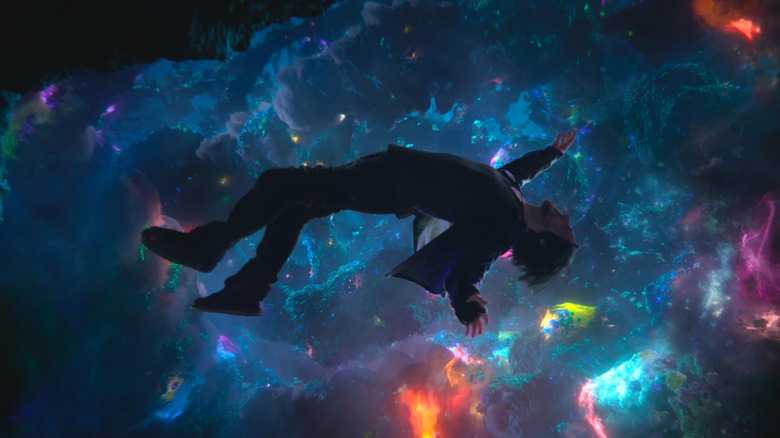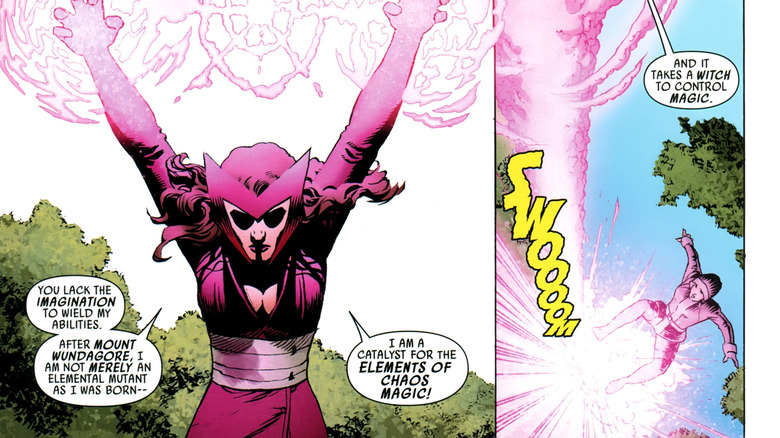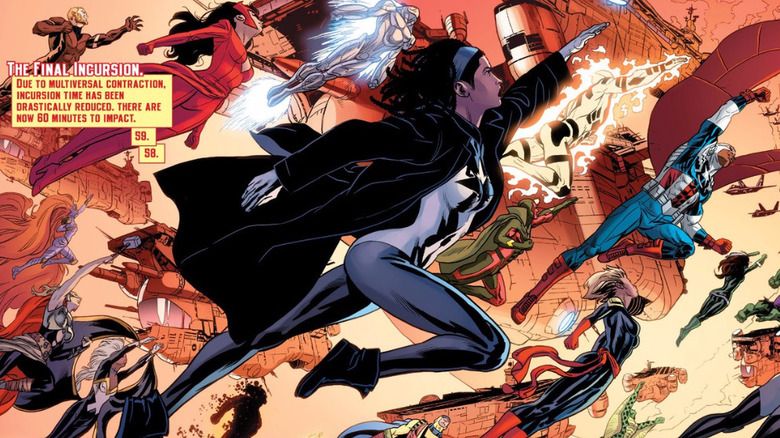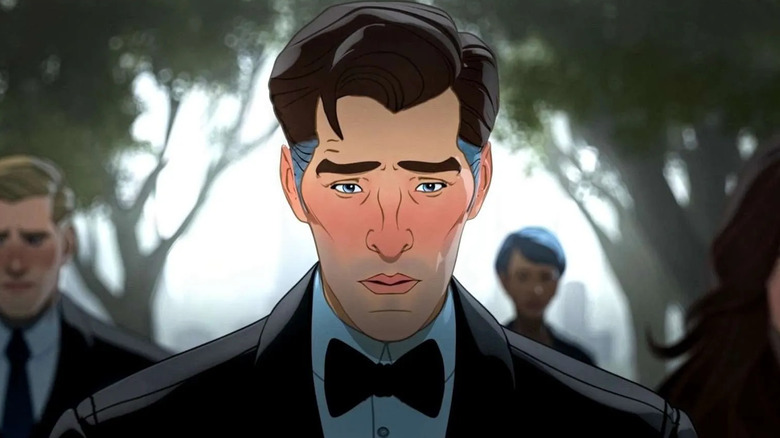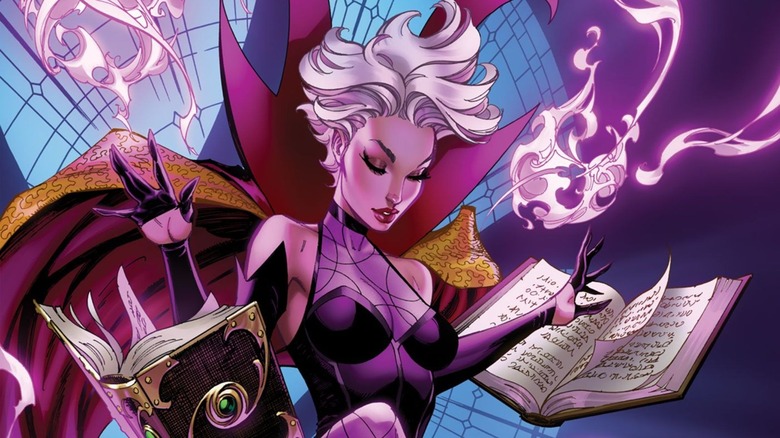Lines In Doctor Strange In The Multiverse Of Madness That Are More Important Than You Think
The Marvel Cinematic Universe has officially expanded into many universes, and they're every bit as untamed and unpredictable as the title of "Doctor Strange in the Multiverse of Madness" suggests. Thanks to the good doctor's second film, a psychedelic odyssey through a series of increasingly unearthly Earths, we now know for a fact that the MCU has no limits. If the fan-pleasing crossover characters of "Spider-Man: No Way Home" are the product of Marvel creatives swinging for the storytelling fences, then the flights of fancy that characterize "Doctor Strange in the Multiverse of Madness" are a veritable home run derby. Every few minutes, the movie offers imaginative acts of magic, glimpses of fantastical worlds, and references to long-awaited places, characters, and events.
It's dazzling stuff. But not every allusion in "Doctor Strange in the Multiverse of Madness" is a visual cameo. Strange and company — many of them alternate versions of the titular sorcerer — drop a hefty grimoire's worth of dialogue that hints at grand events. These lines are a bit less obvious than the bright, colorful Easter eggs lurking in the background, but they can be even more meaningful. They're also uniquely subtle — even hardcore MCU fans might have missed them. These are the lines in "Doctor Strange and the Multiverse of Madness" that are more important than you think.
The grand calculus of the multiverse
"Doctor Strange in the Multiverse of Madness" begins with a pulse-pounding action scene set in the space between universes. Pursued by demons, a ponytailed Strange (Benedict Cumberbatch) tries to reach the all-powerful, all-benevolent Book of Vishanti in an effort to protect multiversal powerhouse America Chavez (Xochitl Gomez). Like so many other Stranges across the manifold cosmos, this Strange fails. In his desperation, he grabs hold of Chavez and begins leeching her power. He justifies this act with a familiar mathematical phrase.
As Chavez writhes in agony, Strange tells her, "In the grand calculus of the multiverse, your sacrifice is worth more than — !" He is cut off by a gigantic demon, which fatally wounds him. But attentive viewers know how that sentence would have concluded, as he's already said it before. Regarding the multiversal villains trapped beneath his Sanctum In "Spider-Man: No Way Home," Strange says, "In the grand calculus of the multiverse, their sacrifice means infinitely more than their lives." His philosophy holds firm, as does his ruthlessness. Unlike his more noble Avengers brethren, Strange is absolutely willing to trade lives for success.
Doctor Strange has buried worse
Doctor Strange is remarkably comfortable with death. When he encounters the dead body of Ponytail Strange, our Strange doesn't flinch. He promptly begins burying him, magically shifting a New York City rooftop to create a makeshift grave. When Wong (Benedict Wong) remarks that such a burial must violate a city ordinance, Strange nonchalantly replies, "I've buried worse."
Fans are used to superheroes like Spider-Man, Superman, and Batman, who operate under strict no-kill policies. To hear a major superhero like Doctor Strange chat so casually about corpses is a shock. On top of that, this line is chillingly open-ended. Strange is an ultra-powerful master of the mystic arts who's a lot more willing to get his hands dirty than most of his Avengers comrades. He very well might have taken the life from these beings he's buried. What sort of beings are we talking about? Well, this alternate version of himself is far from the worst creature he's interred — we'd say that the sky is the limit, but when one is talking about Doctor Strange, that metaphor doesn't cut it. Who knows what animals, aliens, monsters, and people — and from what pasts, presents, futures, and alternate realities — he has left to rot.
Dreams are windows
Every so often, an MCU production will introduce a new element that retroactively changes the way we view the entire franchise. For example, "Eternals" reveals that the development of the human race has been steered by the Celestials, so they might slaughter mankind like farm animals. "Moon Knight" confirms that pretty much every god and afterlife exists, reconfiguring the nature of life and death (and possibly even Thanos' snap) in the MCU. "Doctor Strange in the Multiverse of Madness" drops an even bigger bombshell — one that affects everyone alive, potentially every day.
"Dreams are windows into our multiversal selves," the Scarlet Witch (Elizabeth Olsen) claims — and not in a symbolic or metaphorical way. When anyone in the MCU dreams, whatever they see is real and happening to an alternate version of themselves, somewhere in the multiverse. We've already seen a few characters dream — now, it turns out, those sequences all happened in canon. This has major implications. In "Iron Man 3," for example, Tony Stark (Robert Downey Jr.) dreams of the Battle of New York. Now we know he's really seeing some alternate Tony, who's really fighting it again at that very moment. This is also a recurring nightmare, which implies different Starks are constantly fighting Chitauri invasions that never come to an end.
America Chavez's home
While Strange and America walk through the pleasant streets of Earth-838, they encounter technology that projects their memories as holograms. Strange sees his younger self on a date with Christine Palmer (Rachel McAdams) — the very date in which she gave him his treasured broken wristwatch, in fact. Emotional, he steps away from the machine. America takes his place and generates a hologram of a sunlit meadow. When Strange asks what this place is, America softly replies, "home." They both watch as America's younger self is greeted by her loving mothers.
This short and easily overlooked line has major ramifications. In the comics, America's home is quite an interesting place — especially to the Scarlet Witch and her beloved children, Billy and Tommy. America hails from the Utopian Parallel, a pocket reality created by an all-powerful deity known simply as the Demiurge. The Demiurge is actually the adult, omnipotent form of Wiccan, aka Wanda's son, Billy (Julian Hilliard). If this holds true in the MCU, then the events of "Doctor Strange in the Multiverse of Madness" are especially ironic. The Scarlet Witch wants to murder America and take her dimension-hopping abilities for herself, so she can reunite with Billy and Tommy. But the reality that created America and her powers is the product of Billy's powers — powers that might develop without his mother's help, if we assume Wanda dies in the rubble of Mount Wundagore.
Earth-616
Adrift on Earth-838, Doctor Strange and America Chavez are soon captured by the Illuminati's agents. In a cosmically bittersweet twist, one of these agents turns out to be Christine. She's a renowned scientist in this reality, concerned with the exploration and categorization of the multiverse. One facet of this work is naming each new universe. "Our universe is 838," she tells Strange, "and we've designated yours 616."
Comic readers will be familiar with this designation: The 616 universe is the primary setting for the vast majority of Marvel comics. Over the years, the publisher has introduced readers to dozens of different universes, each with their own number. There's jaunty Earth-1610, home of the "Ultimate Universe." There's war-torn Earth-295, ravaged by Apocalypse. There's bleak Earth-807128, where Wolverine's cantankerous future self, Old Man Logan, dwells. but Earth-616 has always been the center of it all.
On the one hand, Christine's line might only mean that the comics' multiverse and the movies' multiverse both share a symbolic anchor point. But it might also rearrange both continuities at once. In 2016's "The Unbelievable Gwenpool" #3, Strange peers into our reality, where he sees a movie theater showing 2016's "Doctor Strange." "Benedict Cumberbatch, eh? Sure, I could see that," he remarks. But now, both comic Strange and Cumberbatch Strange are denizens of the 616. How might this ink-and-paper Strange react to the knowledge that he and his live-action doppelganger are the same guy?
Mount Wundagore
Much of the second half of "Doctor Strange in the Multiverse of Madness" is set on Mount Wundagore, an ancient mountain crowned with a temple dedicated to dark magic. After Wanda forces Wong to portal them there, Wong remarks, "Masters of the mystic arts weren't meant to tread upon the forbidden grounds of Wundagore." There's good reason for this: The sinister temple at its peak is the birthplace of the Darkhold.
But this mountain's infamy stretches far beyond that depraved tome, as Wong might very well know. In the comics, Mount Wundagore is the High Evolutionary's home base. A major Marvel baddie obsessed with unlocking the ultimate powers of the evolutionary process, he's conducted all kinds of horrific experiments over the years. One of his most infamous saw him take twin babies and hyper-charge their innate superpowers. These twins were, of course, the Scarlet Witch and Quicksilver. The mountain has also been tied to heavy-hitters like Thor, and acts as the home base for Magneto's X-Men during the "Age of Apocalypse."
Reed Richards' children
"Doctor Strange in the Multiverse of Madness" has to convince longtime MCU fans to root against Wanda Maximoff, a former Avenger and fan favorite. It pulls out all the stops to accomplish this difficult task: The fearsome Scarlet Witch destroys Kamar-Taj, summons infernal demons, mind-controls innocents, murders indiscriminately, and spends most of the film attempting to kill an innocent child. Perhaps most horrifyingly, she slaughters the Illuminati of Earth-838 in a gruesomely creative display of her powers.
Killing Captain Carter, Captain Marvel, Black Bolt, and Professor Xavier is one thing. But before Reed Richards (John Krasinski) is reduced to literal ribbons, he attempts to reason with Wanda. "Please," he says, "I have children of my own. I understand your pain." As comic fans know well, he's referring to Franklin and Valeria Richards. They're not just Reed and Sue Storm's kids — they're some of the most important characters in the entire multiverse.
How important are we talking about? Well, Valeria is one of the smartest human beings in existence — her intelligence might even outstrip her father's. Franklin is one of the most powerful entities in the multiverse, capable of creating pocket universes, shaping them to his will, and even restoring the multiverse itself. Though his powers have waxed and waned over the years, at their height, he's basically a god. Time will tell if these kids show up in the MCU — but if they do, we can bet they'll make a big splash.
Incursions and the Illuminati
Multiple characters mention "incursions" throughout "Doctor Strange in the Multiverse of Madness." These apocalyptic disasters occur when two universes collide. Use of the Darkhold can cause an incursion, as the Illuminati of Earth-838 know well — their Strange brought one about through that book's dark powers. This resulted in the destruction of an entire reality. "You, our friend," Reed Richards intones, "had caused the annihilation of another universe." Trillions died as a result.
Incursions are nothing new to comic readers. They feature especially prominently in the work of writer Jonathan Hickman, especially his "New Avengers" run, and come to a calamitous head in the 2015 "Secret Wars" event. Here, the Marvel multiverse begins collapsing. Incursions become more and more common, gradually emptying the multiverse of (nearly) all life. The Illuminati spearhead attempts to avert these catastrophes, with varied results. The fact that this group's MCU debut happens alongside the introduction of incursions is interesting. Could the MCU be setting up a cinematic rendition of "Secret Wars"? It seems like a very real possibility.
Donna's death
As "Doctor Strange in the Multiverse of Madness" approaches its climax, 616 Strange and 838 Christine find themselves trapped in the bleak remains of a dying universe. They soon encounter this universe's Strange, a broken man surrounded by the ruins of his Sanctum. When he asks 616 Strange to prove himself, 616 Strange says, "We had a sister. Donna. She, uh ... she died when we were kids. We were playing on a frozen lake. She fell through the ice. I couldn't save her." The other Strange confirms this is true.
This reveals a major component of Doctor Strange's backstory, and sheds light on the character's arc thus far. A major theme of this movie is Strange's inability to commit to personal relationships: Scared by the demands of true intimacy, he replaces it with heroics and praise. This resonates even more intensely, knowing he lost a loved one at a tender age, due to — in his opinion — a lack of heroism. It's also interesting to note that Ponytail Strange, the very first alternate Strange we meet, uses ice magic during his time on screen. Perhaps that Strange internalized the trauma of Donna's wintry death a bit more deeply than most, much like DC's Batman takes on the guise of the bats he so fears.
Clea's here to fix it
The very last line of "Doctor Strange in the Multiverse of Madness" — aside from a beaten, bruised Bruce Campbell howling "It's over!" — comes from a mysterious woman who portals herself directly in front of a strolling Strange. With her crackling, magical doorway open right in the middle of Bleecker Street, this white-haired, purple-clad sorceress tells Strange, "You caused an incursion. We're gonna fix it."
To any fans in the know, this moment is a major one. First, it lends more credence to the idea that the MCU is heading towards an incursion-heavy, multiverse-centric crossover event like "Secret Wars." Strange spends much of that storyline combating incursions and protecting realities, which seems to be what this woman wants him to do. Second, as the credits reveal, this sorceress is Clea. A magic user of unfathomable power, Clea is Strange's longtime ally and love interest. Marvel has begun making a clear effort to replace its original lineup of heroes with newer counterparts — there's a new Captain America, a new Black Widow, and a new Hawkeye. Clea may very well be a potential replacement for Doctor Strange. In fact, her comic book counterpart recently replaced Strange as Earth's Sorcerer Supreme.
